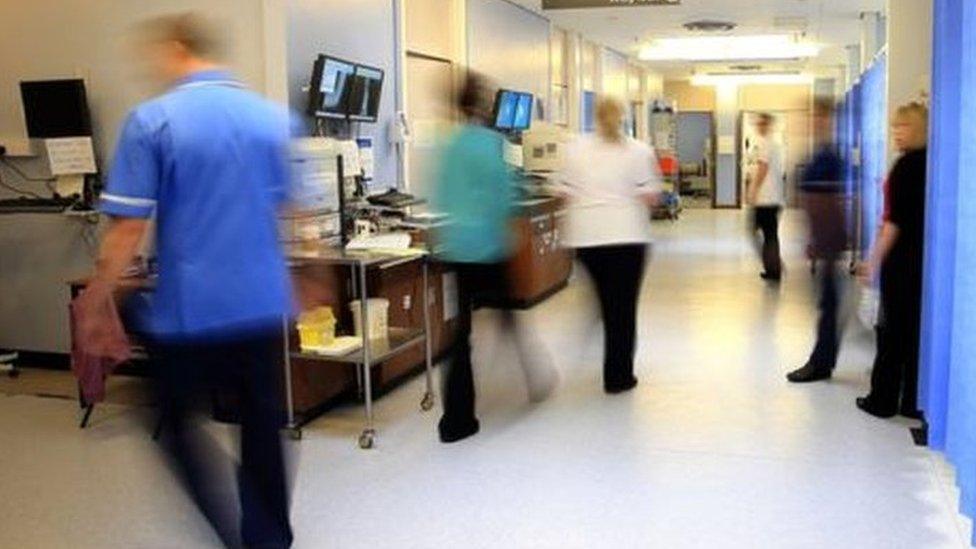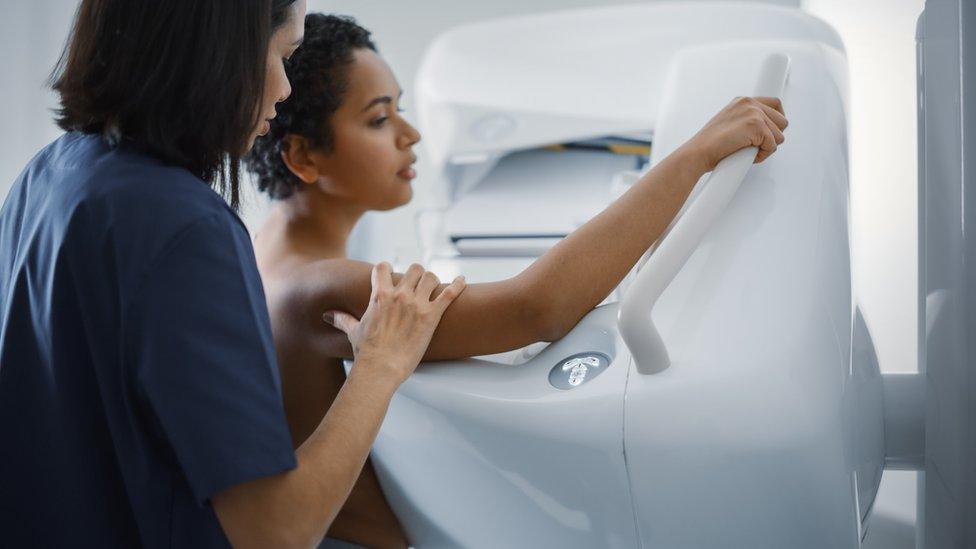NHS Wales waiting times: Minister accused of 'political hit'
- Published
Sally Nugent challenges Steve Barclay on waiting list comparisons
Wales' health minister has told her UK government counterpart to stick to his own job after he said he was open to requests to help treat patients in England.
Waiting times in Wales came in for Tory criticism over the weekend with recent figures showing 20.1% of patients waiting more than a year.
That was compared to 5.2% in England.
Eluned Morgan accused Steve Barclay of a "naked political hit" - but admitted waiting times were a problem.
She said she would take up the offer if it was free. A source told BBC Wales that ministers would have to pay for extra treatment.
On Sunday the UK government health secretary, who is responsible for the NHS in England, invited Welsh and Scottish ministers to discuss how to best tackle NHS waiting lists.
Hospital waiting lists in England hit a record 7.57 million people in June.
The Welsh government is also facing budget pressures with ministers asked to find new and unplanned spending cuts over the summer.
At the weekend Mr Barclay said it was offering "to give patients in Wales the same rights that they would get in England, which is that if they are prepared to travel, they can go to any hospital which can offer them the treatment they need and get treated".
BBC Wales was told by a source at the UK government's Department for Health and Social Care confirmed that Welsh government would have to pay for extra treatment for Welsh patients in England, in line with existing arrangements.
They would not confirm whether there was sufficient capacity in the English NHS to take extra Welsh patients.
In an interview with BBC Radio 4's World at One, Ms Morgan admitted the Welsh NHS was "challenged in terms of waiting lists".
"But I think there's a whole load of areas where we are doing considerably better, including and in particular, access to GPs, and certainly our improvement in terms of emergency departments is much better.
"If it's a free offer, I'll be taking up that offer. My guess is that it's not.
"The real question is where on earth will he find the capacity from in England where he's got 7.5 million people waiting for treatment there.
"It's naked political hit in the middle of the silly season, that's what this is about.
"I think it's really important that he should concentrate on his job and I'll concentrate on mine."

Figures from July showed that 136,549 of "patient pathways" - individual waits for treatment - were for more than a year.
When adjusted to make them more comparable with England, the figures showed 20.1% of patients in Wales are waiting more than a year for consultant-led specialisms, compared to 5.2% of patients on similar waiting lists in England.
There are 4.5% of patients in Wales waiting more than two years, compared to hardly any in England - 0.01%.
Statistics from the month also showed that for the last 10 months, Welsh emergency departments have been performing better than those in England against the four-hour target, when major A&E units in Wales were compared to those of similar grade in England.

Analysis by Gareth Lewis, BBC Wales political editor
Perhaps the saddest element of the past 36 hours is that if you are waiting for treatment - be that in Wales or England - the current row gets you no closer to receiving it.
Steve Barclay's offer is not an open one. The Welsh government, already trying to find savings of about £900m, would have to pay to send extra patients over the border. And the Department for Health in England would not comment on whether the English NHS has any spare capacity to take any more in the first place.
Wales does have a big problem with the longest waiting lists. As a proportion there are far more people on them than in England.
But England is also facing its own issues - more than seven and a half million people are now waiting for treatment, a new record.
Cue accusations from Wales's health minister that this is all political. And expect more of this. As the General Election approaches and politicians fight tooth and nail for votes (carefully mind you, as there might be a long wait for treatment were they to break one) every side will be highlighting where they think the other is doing badly where they are in power.
Related topics
- Published10 August 2023

- Published13 August 2023

- Published14 August 2023
